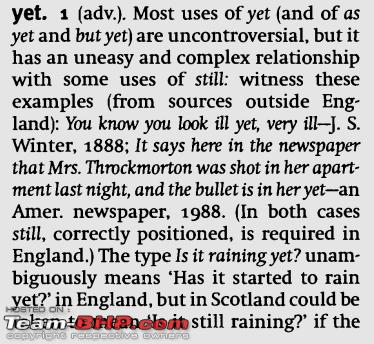Team-BHP
(
https://www.team-bhp.com/forum/)
Quote:
Originally Posted by Thad E Ginathom
(Post 4657980)
Is there a similar explanation to the "misuse" of till?
|
Didn't quite get what the misuse is.
Quote:
Originally Posted by binand
(Post 4658651)
Didn't quite get what the misuse is.
|
Considering that the usage of "till", without a change in the situation, being accepted, it may be contested as being a misuse.
"until now," in British English, means things just changed. But the Indian usage is so well established, it's moot to call it misuse.
What does USA do on this one?
Quote:
Originally Posted by Thad E Ginathom
(Post 4658853)
"until now," in British English, means things just changed. But the Indian usage is so well established, it's moot to call it misuse.
What does USA do on this one?
|
'Till date' is a regular usage in Indian English.
'Till date I have not faced any problems' means 'am yet to face any problems'
Whereas 'Until now' is used when there is change.
'Until now everything was alright but...'
Aren't these proper English?
Quote:
Originally Posted by Thad E Ginathom
(Post 4656688)
Because you can does not mean you should. Good English is as much to do with style as grammar.
|
I am in total agreement with you. My observation was more of a lament rather than a justification. Being in IT, I get to hear a lot of sentences in made up English and I cringe at every single one. Missing prepositions is a major thing.
However everything is accepted because people stress on communication being achieved. There is also a message being circulated on LinkedIn which says that knowing correct English is not a sign of being intelligent. And people interpret this as they wish.
Quote:
Originally Posted by mallumowgli
(Post 4658869)
'Till date' is a regular usage in Indian English.
'Till date I have not faced any problems' means 'am yet to face any problems'
Whereas 'Until now' is used when there is change.
'Until now everything was alright but...'
Aren't these proper English?
|
As per my post, no, these are not "proper" English.
To be honest, I have been wondering what is the "English" way of saying
up to now and no change. I seem to have forgotten!
Quote:
Originally Posted by Thad E Ginathom
(Post 4659108)
As per my post, no, these are not "proper" English.
To be honest, I have been wondering what is the "English" way of saying up to now and no change. I seem to have forgotten!
|
Would "thus far", "haven't yet" fit the bill?
Quote:
Originally Posted by swissknife
(Post 4659134)
Would "thus far", "haven't yet" fit the bill?
|
They might. Sometimes I feel strangely divorced from my mother tongue, even though I have failed to learn a step-mother tongue!
Quote:
Originally Posted by Thad E Ginathom
(Post 4658853)
"until now," in British English, means things just changed. But the Indian usage is so well established, it's moot to call it misuse.
What does USA do on this one?
|
They use "yet" instead. I have yet to have a problem with it
Cheers
Quote:
Originally Posted by Thad E Ginathom
(Post 4659108)
As per my post, no, these are not "proper" English.
To be honest, I have been wondering what is the "English" way of saying up to now and no change. I seem to have forgotten!
|
"Yet"
And I am adding a random sentence because the forum does not like succinct responses.
Cheers
Earlier, I was reading some stuff about
yet in
Fowler's English Usage (the most recent edition to be freely available online).
Sorry, I forgot to allow for the watermark!
I have been wondering what does SIC really mean and what's the correct usage.
Also is it used to say something disapproving or just convey something matter-of-factly ? I have seen instances for both.
Quote:
Originally Posted by luvDriving
(Post 4664425)
I have been wondering what does SIC really mean and what's the correct usage.
Also is it used to say something disapproving or just convey something matter-of-factly ? I have seen instances for both.
|
(sic) is used when quoting something that has grammatical or spelling errors. It means that the text quoted has some mistake, and that mistake was also quoted as it appears in the original source.
I found that the internet made it easy to use exclamation marks! So I cut down! And now I only use them when I mean it! Too many look bad! Right!
But, like not starting with "So,....," I thought this was something we all secretly knew, and just had to admit.
By the way, not that I remember it very well, but the photo must be some sort of teacher's correction. It is not something that I would have recognised as standard proof-reading symbols when I was a typesetter.
And what is a "sarcmark?"
So, there I was....
Quote:
Originally Posted by Thad E Ginathom
(Post 4677541)
And what is a "sarcmark?"
So, there I was....
|
You didn't Google that, did you ؟؟ :D
| All times are GMT +5.5. The time now is 17:47. | |



